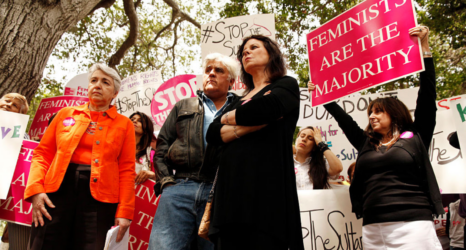“I am 28. I work in fast food and have barely enough money on a monthly basis to cover basic needs. I want children someday, but my partner and I were actually using contraception when I got pregnant. I so much appreciate the opportunity I’ve been given to choose how and when I start a family. I come from a very strict conservative family, and have not received any financial or emotional support from them. To have someone in my corner is an absolute godsend. THANK YOU.”
Every Monday, Sylvia Ghazarian volunteers on the phone for the Women’s Reproductive Rights Assistance Project (WRRAP), listening to the stories of women in desperate need of financial or logistical support for abortion services or emergency contraceptives.

She recalls a child the organization was able to help in a dire situation.
“Just this past year, I had a case in Georgia with a 12-year-old who was raped that we were able to support,” Ghazarian told Ms. “These are the types of stories that keep us going, too, in terms of being able to help as many people as possible.”
Ghazarian, the executive director of WRRAP, told Ms. that since abortion access in many states is jeopardized by the coronavirus, the organization’s services to help those in need—like the 12-year-old from Georgia—are more important than ever.
Since the beginning of the pandemic, women in Alabama, Texas, Iowa, Louisiana, Ohio, Texas, Oklahoma and Tennessee have been subject to Republican politicians’ attempts to use COVID as an excuse to limit abortion access by labeling the practice “non-essential.” Clinics have been forced to keep up with the political ping-pong in states like Texas, where abortion bans seem to constantly be flipping between lifted and enforced.
Donations to abortion funds like WRRAP provide financial assistance those seeking abortions across the nation. And because WRRAP is independent and national—working with clinics throughout the U.S.—the ever-changing state abortion laws do not have a halting effect on its work.
“We are able to provide support in all 50 states, and that is not necessarily what can happen with some of our sister abortion funds that may be in Texas or Tennessee. A lot of them are mandated to only provide in their state or their county,” Ghazarian said. “I want to get that information out there so that people know that we exist and that we’re able to be helpful in all states.”
Ghazarian said WRRAP has seen an increase in patient calls and queries.
To determine funding, the organization evaluates situations on a case-by-case basis before sending funding to one of their 700 WRRAP-affiliated clinics or doctors across the nation.
When listening to patients’ stories, Ghazarian said she has noticed an uptick in patients who must commute long distances to get abortions—another trend in reproductive healthcare during the pandemic.
“The biggest trend I’m noticing is that there are a lot of patients that are commuting. And, it’s unfortunate because, here we are in a situation with COVID where everybody’s safety is at risk by traveling,” Ghazarian said.
According to Ghazarian, about 63 percent of WRRAP’s funding goes toward helping those in abortion-hostile states—and a majority of their patients are low-income women of color.
“Obviously, the biggest portion of our funding is women of color and those who are on or below the poverty line. Being able to navigate COVID plus what they’re going through is just … unreal, right now,” she told Ms.
One WRRAP volunteer, Danielle, has been working for the organization for the past three years. She said she found the non-profit when looking for a way to fight for a cause important to her.
“I’m just so proud to be able to work for this organization,” Danielle said. “It’s so well run, and it’s so organized, and I feel, without a doubt, we’re making a difference.”
Despite the assistance the organization does provide, Danielle said that she always wishes she could help even more people.
“It’s gratifying what we can help with, but it would always be wonderful if we could help even more,” Danielle said.
Post-procedure, those for whom WRRAP has helped secure funding often write to the organization with high words of praise and thanks—revealing the often life-saving impact the nonprofit has on their lives.
“Feeling hopeless and pregnant doesn’t do anyone any good emotionally. WRRAP gave me piece of mind and the help I needed,” one testimonial read.
Ghazarian has long advocated for women’s rights. Most notably, she was appointed by the mayor to be the chair of the Commission on the Status of Women to research and advocate for policies regarding health care, human trafficking, homelessness and more.
With or without the added struggles that arise with coronavirus, Ghazarian continues to exemplify extraordinary empathy for the women and people for whom she fights.
“I have no words,” she said. “It’s just unreal, the amount of discrimination and inequality that exists out there for women in particular. It’s hard to wrap your head around that you don’t have the right to do what’s right for you.”
Organizations like WRRAP depend on donations—and nearly 90 percent of the funding raised by WRRAP goes to funding procedures. To donate, visit www.wrrap.org/donate.
The coronavirus pandemic and the response by federal, state and local authorities is fast-moving. During this time, Ms. is keeping a focus on aspects of the crisis—especially as it impacts women and their families—often not reported by mainstream media. If you found this article helpful, please consider supporting our independent reporting and truth-telling for as little as $5 per month.





